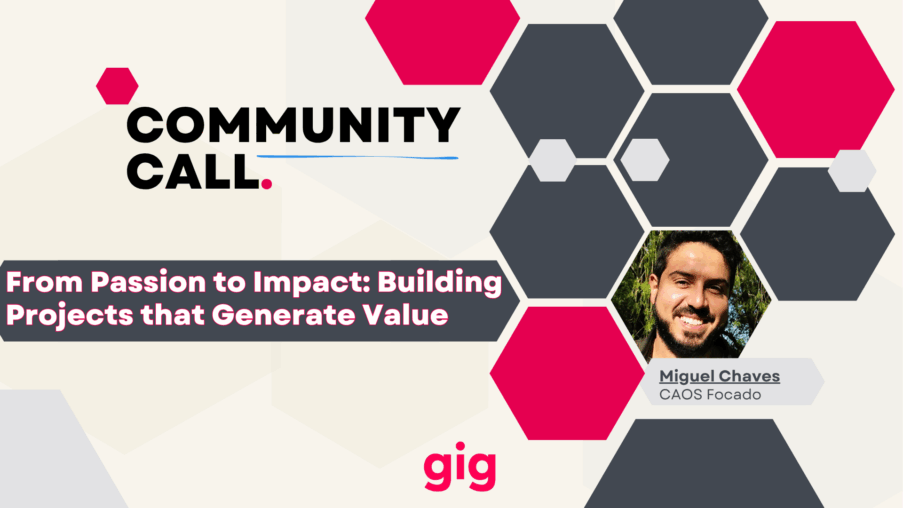The Global Innovation Gathering (GIG) recently hosted a community call focusing on project sustainability and value generation. The session featured Miguel Chavez, a GIG member who joined the network in 2015, sharing his professional trajectory. The discussion explored achieving sustainability beyond relying solely on grants or investment, emphasising the necessity of generating value for users and for the initiative to survive and thrive.
Chavez’s career demonstrates a commitment to achieving social impact and personal fulfilment. His experiences include helping build a non-profit makerspace in a slum in São Paulo, Brazil; co-founding Nave-a-Vela—a startup that assisted schools in makerspace development from 2014 to 2020; and supporting researchers through venture building from 2020 to 2025. His current efforts involve co-creating CAOS Focado, an impact investment fund focused on supporting the survival and growth of deep-tech startups.
Miguel detailed his initial projects, starting during his university years as an engineer. He helped design low-technology solutions, such as a warehouse structure utilising recycled materials to contain mice and snakes for an indigenous community. The technology design process did not initially consider grants or revenue generation, focusing strictly on creating value for the people intended to use the solution. An early failure point was that only a few neighbourhood residents adopted the technology, citing difficulty with the construction process.
Another initiative involved building low-cost solar panels made from recycled materials for use in slums. This project successfully secured a $15,000 grant from the Inter-American Development Bank (IDB) before selling any units. Despite the initial grant success, this project also encountered difficulties upon attempting sales. Community members reported that the technology was not well-executed or aesthetically pleasing enough for placement on their houses, and they also remarked on its challenging assembly. Furthermore, common electric showers used in most parts of Brazil, especially in low-income areas, are cheap and easy to install. This outcome led to a realisation: focusing entirely on impact without creating something people want to use or buy leads to dependence on grants and investments.
Miguel initially began seeking projects that could utilise grants or investments, transitioning to generating revenue and sustaining operations over time. He secured a $200,000 grant from MIT for a four-year project to establish an innovation space, a makerspace, inside a favela. The space’s objective was to cultivate innovations originating from community innovators for community use. The makerspace goal of engaging adults and entrepreneurs proved difficult. However, children and young people utilised the space readily to build their own items and technologies, exercising their creativity. This insight regarding youth engagement provided a market direction.
Based on this observation, Mr Chavez co-founded Nave-a-Vela. This startup enabled schools across Brazil to establish makerspaces, capitalising on the maker movement at the time. The spaces focused on teaching soft skills—including creativity, resilience, and teamwork—through project-based learning (PBL) for K12 students. Nave-a-Vela demonstrated a key value generation model. A portion of its profit was used to pay for the community innovation centre, ensuring the favela space’s continuing growth and operation. Miguel sold Nave-a-Vela in 2019, but this experience solidified the concept that starting with grants is possible. Still, one must create value for a paying entity (in this case, schools) to achieve scale and avoid project failure.
Miguel applied the learned lessons from scaling Nave-a-Vela to a venture builder model called CAOS Focado (Focused CHAOS). CAOS Focado operates as a deep tech venture builder, partnering with PhDs and researchers to transform academic knowledge into commercial companies. CAOS Focado creates startups at the intersection of science, technology, and impact, focusing primarily on the agrifood and healthcare industries, areas that demand deep technology solutions in Brazil. CAOS Focado methodology employs a six-phase process for project development:
- Genesis (concept finding),
- Discovery (market divergence),
- Validation (reaching minimum viable product, MVP),
- Traction (product repetition), and
- Structure.
Working in deep tech requires minimising errors, as mistakes lead to substantial losses of time and capital, unlike the costs associated with digital projects. The company’s purpose is to prevent founders from entering prolonged cycles of failure, which lead to a loss of motivation and company cessation.
A core discussion point was the necessity of the “bridger” function. Mr Chavez explained that he is not the foremost expert in technologies such as AI or bio-printing. Still, he is skilled at finding experts and connecting their technology to market needs and society. This function involves understanding how to “dress” the technology and create value for external ecosystems, such as companies and consumers. The primary job is finding the right people to build the proper teams, enabling the resulting organisations to operate independently.
Attendees noted the challenge for local innovation hubs in bridging the gap between daily operations and high-tech industry solutions. Mr Chavez’s trajectory was identified as embodying GIG’s nature, demonstrating how members can move from initial conceptual ideas toward sustainable enterprises. GIG plans to study this journey to develop frameworks that support other members in achieving sustainability and impact. It aims to guide and design projects that serve social impact objectives while generating the returns needed for continued operation. GIG anticipates continued collaboration with Mr Chavez to apply this knowledge for the network’s benefit.


